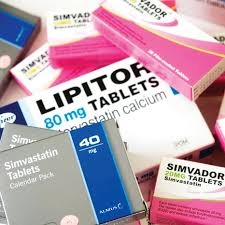Bad news for heart patients – statin side-effects are real
05 Apr 2016
Statins like Lipitor and its generics have revolutionized cardiovascular care for nearly two decades as an effective, inexpensive way to reduce LDL cholesterol, the so-called bad cholesterol in the bloodstream.
 Not everyone can take them, though; a significant number of people complain of muscle pain, weakness and cramping so severe that they discontinue the therapy even at the risk of a heart attack or stroke.
Not everyone can take them, though; a significant number of people complain of muscle pain, weakness and cramping so severe that they discontinue the therapy even at the risk of a heart attack or stroke.
Their resistance to the medication has been controversial, because in most cases there are no biomarkers for the muscle problems individuals describe. Some researchers have speculated that the problem is psychological, the ''nocebo'' effect of blaming the medication for the pain.
But a study released Sunday shows for the first time that statin intolerance is very real and that a newer, different kind of drug can have a strong impact on these patients' high cholesterol.
Researchers found that 42.6 per cent of people who had complained of muscle pain while taking at least two statins experienced the same symptoms when given a statin during the study but had no ill effects when administered a placebo.
They were then able to reduce their LDL cholesterol levels by more than half when given a PCSK9 inhibitor, evolocumab, for 24 weeks, compared with just a 16.7 per cent reduction on ezetimibe, another medication.
The US Food and Drug Administration approved PCSK9 inhibitors last year, but only for small groups of people, including those with an inherited disease that dramatically elevates their LDL cholesterol levels.
''This problem of statin intolerance is one of the most vexing problems for both patients and physicians in cardiovascular medicine,'' said Steven E Nissen, chairman of the Department of Cardiovascular Medicine at the Cleveland Clinic.
He said the new study, which he led, offers hope for people who have not been able to take statins because of side effects.
The research was unveiled Sunday at the American College of Cardiology's annual conference and published simultaneously in the medical journal JAMA.
It was funded by Amgen, maker of evolocumab, an injectable PCSK9 inhibitor. Nissen has worked with many pharmaceutical companies to determine the efficacy of heart therapies but requires the companies to donate any payments to charity so that he receives no compensation or tax breaks.
Heart disease is the leading killer of Americans, and some 73 million people in the United States have high LDL cholesterol, which can greatly increase their cardiovascular risk.
Millions of people take statins to lower their risk. In 2013, the American College of Cardiology and the American Heart Association released new treatment guidelines that would substantially increase the number of people on statins.
Mary Norine Walsh, vice president of the American College of Cardiology and medical director of Heart Failure and Cardiac Transplantation at St. Vincent Heart Center in Indianapolis, called the study ''encouraging.''
PCSK9 inhibitors, she added, are ''going to be, possibly, an option for patients who are statin intolerant.''
But that may not happen for a while. In addition to requiring FDA approval, the drugs are much more expensive - from $10,000 to $15,000 a year.
And because evidence of statin intolerance is largely subjective, insurance companies may balk until there are ways to more conclusively prove that patients are unable to take the cheaper drugs.
The two therapies have not yet been compared against each other in a randomized, controlled study, Walsh noted.
The PCSK9 inhibitor works by blocking a substance that hinders the liver's ability to remove cholesterol from the blood. Ezetemibe, by contrast, decreases cholesterol absorption in the small intestine.
The monthly injections of the PCSK9 inhibitor proved far more effective after 24 weeks, cutting patients' LDL cholesterol by an average of 52.8 percent, compared to 16.7 percent for the other drug.
One question raised by the study is what to make of the 26.5 per cent of statin-intolerant patients who complained of muscle pain while taking the placebo. For that, Nissen said, there are no immediate answers. ''It is really a complicated problem for medicine and for patients,'' he said.
In another study released Sunday morning, researchers showed that a drug that raises HDL cholesterol, the so-called good cholesterol, and lowers LDL cholesterol does not help high-risk heart patients. In fact, the study of more than 12,000 people was cut short after the results revealed that the drug, evacetrapib, did not prolong the time until death, heart attack, stroke, coronary artery bypass surgery or hospitalization for chest pain due to restricted cardiac blood flow.
It was the third failure for drugs in a class known as cholesteryl ester transferprotein (CETP) inhibitors, which disrupt the process by which HDL cholesterol is converted to LDL cholesterol, the ACC said in a release.
''Here we've got an agent that more than doubles the levels of good cholesterol and lowers bad cholesterol and yet has no effect on clinical events,'' lead researcher Stephen Nicholls, a cardiologist at Royal Adelaide Hospital in Australia, said in the release. ''We were disappointed and surprised by the results.''


















